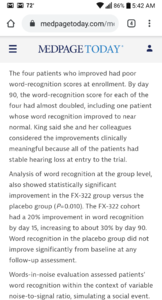I think if they can prove improvement in the ultra high frequency audiogram (though I suspect at the much higher doses the drug will very likely diffuse into the "standard" audiogram ranges) in phase 2a, then i think it's only a matter of time before they figure out how to get it deeper into the cochlea.This is what it says in the IPO document: "The drug diffuses into the cochlea and is expected to create the greatest concentration of drug in the high frequency region of the cochlea."
Frequency Therapeutics tested hearing up to 8000 Hz in the clinical trials. Some people on this site suggest there was no impact on audiogram because the drug did not reach inner cochlea where lower frequencies are located. If that is the case then there is a problem with drug delivery. Maybe you have to stand on your head for two days to make it work
E.g..something like this?
https://www.ncbi.nlm.nih.gov/pubmed/12621336/

 Member
Member
